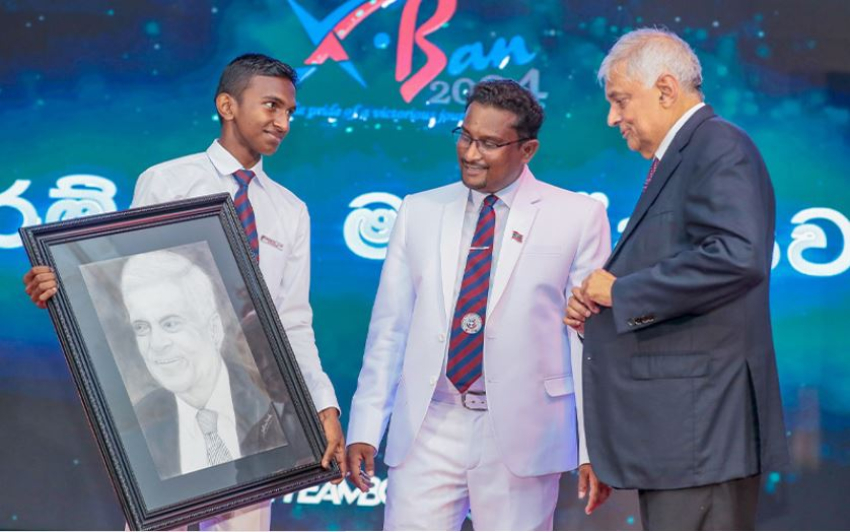President Ranil Wickremesinghe announced that Sri Lanka will implement a strategic plan over the next decade to create job opportunities for its youth domestically, rather than having them seek employment abroad.
He notified that failing to execute this plan would undermine the government’s significant investment in education and stressed the necessity for Sri Lanka to progress beyond its current status as an underdeveloped nation.
Addressing the 106th College Day celebrations of Bandaranayake College Gampaha, today (24), President Ranil Wickremesinghe highlighted his efforts to reform the education system to better align with new technologies. He assured that necessary funding will be allocated for this purpose.
During the visit, President Wickremesinghe received a warm welcome by the college band while the cadet corps welcomed him with a presidential salute. He also paid floral tributes at the College War Heroes Memorial.
The President inaugurated the “X-ban” 2024 Education Science Technology, and Trade Exhibition, held in conjunction with the college day celebrations. Bandaranayake College Principal Kasun Gunarathne presented the President with a souvenir of the exhibition.
Additionally, the President awarded gifts and certificates to students who achieved outstanding results in the G.C.E. (Advanced Level) examination.
In his address to the gathering, President Ranil Wickremesinghe further elaborated,
“I last visited this college in 1992. Before that, as the Minister of Education, I arranged for the construction of necessary buildings for this college. Later, in 1992, I visited the college as the Minister of Industry and Technology, and we discussed the advancements in technology needed for the college.
Today, those discussions are reflected in the exhibition at Bandaranayake College. Over the past 30 years, our country has experienced rapid changes. However, four years ago, the COVID-19 pandemic caused our economy to collapse, leading to significant hardships for everyone. We faced severe shortages of fuel, medicine, and food, and the struggles were widespread.
Fortunately, we have emerged from that difficult period, and with the end of the economic crisis, we expect to recover our foreign aid funds soon. Nevertheless, we still face challenges and must proceed with a well-structured plan. By following this plan, we can gradually alleviate the economic burden and strengthen our economy over the next two to three years, ultimately enabling us to offer more benefits to the people.
For the past four years, we have had to limit spending on education. Now, we must invest in education and update the school system with new technology. At today’s exhibition, we saw drones created by college students and developments in Artificial Intelligence (AI) within schools. Funding is required for these initiatives, and we also need to recruit more teachers. I have reached out to Mr. Elon Musk for assistance with these educational challenges and to support schools in need. By the end of this month, we aim to provide him with the necessary licenses to support these efforts in Sri Lanka.
Attention must be given to young people completing their school education. For the past four years, we have been unable to provide sufficient job opportunities, and this number will continue to rise. We need to address this issue urgently to prevent potential protests and avoid negative international scrutiny. A major economic transformation is necessary to create jobs and income sources.
We faced a similar situation in 1977, when there were no industries in the Gampaha district. At that time, we established the Katunayake and Biyagama trade zones, and then President Chandrika Kumaratunga initiated factories in the Attanagalla area. Today, the Gampaha district is home to many factories. We are also planning to start an industrial park in Keragala next year. Additionally, relocating the oil refinery to Trincomalee could lead to the development of a large industrial town in the Sapugaskanda area. It is crucial to implement new initiatives to generate jobs; otherwise, we risk further unrest and challenges.
We have also launched an agricultural modernization program to enhance the country’s agriculture. Additionally, we aim to boost the tourism sector from 2.5 million to 5 million visitors and develop a large technology-driven economy. This requires a new generation equipped with advanced technical knowledge, which is why we are planning to establish four new technological universities. We are committed to driving a significant transformation across these sectors to build a new economy. Without this economic shift, our children face an uncertain future.
Currently, many of our youth seek employment in countries like the United States, Dubai, and Singapore. We must ask ourselves why we cannot create similar opportunities here in Sri Lanka. Over the next decade, we must focus on addressing this issue, developing the country, and generating new job opportunities. Otherwise, our investment in education will yield no benefit, and Sri Lanka will continue to struggle as a poor nation.
In order to address this issue, we must follow a strategic plan within the next decade. The government is working to introduce the necessary laws for economic transformation, strengthen the export economy, and compete in the global market. Sri Lanka, along with Burma (Myanmar) and Thailand, is one of the main countries where Theravada Buddhism is practiced. While Myanmar remains entrenched in out-dated systems, Thailand has made rapid progress by embracing modern approaches.
As a nation that upholds Theravada Buddhism, we must decide our path forward. We should aim to succeed in the global market within a Buddhist framework, similar to Thailand. By working together towards this vision, we can create a new economy that addresses the employment problem and fosters an environment where people choose to stay in Sri Lanka”
MP Milan Jayathilaka, Senior Adviser to the President on Climate Change Ruwan Wijewardene, former Minister Pandu Bandaranaike, Air Force Commander Air Marshal Udeni Rajapaksa, President’s Media Director Waruna Rajapaksa, as well as teachers, students from the schools, and several other guests were present at the event.




















